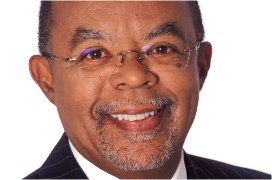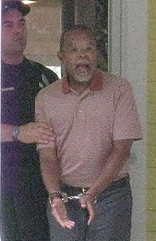
There are two conflicting accounts regarding the details of the arrest of celebrated Harvard professor Henry Louis Gates, Jr. in his own home by the Cambridge police department -- that of the professor and that of the police.
The public reaction has also been equally split, some crying racial profiling others insisting that the officers only did their job and blaming Gates for having a chip on his shoulder and for "losing it."

One thing seems clear to me, regardless of who is right and who is wrong, Professor Gates should never have been arrested -- the police department owes him a public apology.
Professor Gates had just come home from a trip to China. He and his chauffeur had a hard time opening his home's jammed front door. A passerby called 911 to report "two African-American men with backpacks" attempting a "forced entry."
The Cambridge police department sent two police officers to the scene. So far, so good. If anything, the police is to be lauded for their quick response to the call which to their knowledge could have been an attempted break in and burglary.
By the time they arrived, Gates had managed to release the front door and was already inside his home.
This is where the conflicting accounts begin.
According to the police, Professor Gates greeted the cops with a "belligerent" attitude, refusing to show them identification when asked, and refusing to step outside when asked. He was angry, rude and offensive. He eventually showed them his Harvard ID and eventually stepped outside where he was arrested for disorderly conduct and taken to the Cambridge police station.
Professor Gates contends that while he was testy, he did show them two pieces of ID when asked: his Harvard ID and his driver's license. He claims that the cops had it in for him, that he was a victim of racial profiling.

Now, Professor Gates happens to be no ordinary professor. He is not only one of the nation's most respected and most decorated black professors, he is one of the nation's most respected and most decorated professors period.
Gates who has been teaching at Harvard for 18 years is the recipient of nearly 50 honorary degrees and numerous awards including the U.S. federal government's highest honor for achievement in the humanities. In 1997, Gates was listed as one of Time magazine's "25 most Influential Americans." (He even has a burger named after him at a local burger joint frequented by Harvard students and faculty.)
One thing is for sure, "belligerent" and "disorderly" do not seem like apt descriptors for someone who must have mastered the art of discipline and wisdom to have gone this far.
Testy? Perhaps. But is testy a crime in Cambridge, Massachusetts?
After all, who would not get a little testy after having just come off a 20 hour flight, greeted by a jammed front door, and then met by police officers in their own home who probably were not the epitome of polite discourse themselves. It seems to me highly unlikely that a man of Gates' stature would get testy without being provoked. It is also unlikely he was ever a threat to the visiting officers.
And whether he identified himself immediately or after a verbal exchange, the undisputed fact is that he did identify himself and the officers were able to discern without question that Gates was indeed the resident of the house -- not the potential burglar they had come for.
So why was he arrested still?
Whether racial profiling was at play or not is a matter up for debate.
It can reasonably be argued that had Gates been white, the officers would have likely responded with something like this: "professor, we are sorry for the inconvenience, we understand your frustration, but you should also understand that we are simply doing our job. Have a good day."
And they would have left it at that.
But the fact that he was arrested despite having identified himself, hauled off in hand cuffs like a criminal where he was further questioned and his mug shots taken, smacks of retaliation by an ego-bruised officer -- if not racial profiling.
While the charges have since been dropped, the arrest never should have happened.
Professor Gates is owed a public apology by the arresting officer and the Cambridge police department. Instead, a spokesperson for the police department has shown no remorse for the arrest, still insisting in a news conference yesterday that there was "probable cause" for the arrest.
Meanwhile, larger questions linger about what it means to be black in post-racial America, especially as it relates to law enforcement where the relationship between blacks and white police officers has historically been one of mutual suspicion.
For me, the Gates affair raises the following important question: while it is easy to come to the defense of a black man who happens to be a world class academician, how many less fortunate blacks get arrested on even more flimsy grounds but whose cases never make it through to public opinion and in whose defense no one ever shows up?
There is no denying that we all harbor some form of prejudice here or there.
To have some traces of prejudice in our back minds is one thing, to embrace those prejudices and to act upon them is a much less tolerable affair -- especially if you are a police officer where it then becomes an issue of abuse of power.
Ronald Davis chief of police for the city of East Palo Alto laid it best, telling CNN that for police officers, "race is a descriptor, not a predictor," or at least it ought to be.
Which raises another question: given the undeniable history of racial profiling against blacks and other minorities in this country, what are police departments doing to ensure that we truly move beyond race and culture as a predictor of bad behavior by men and women in uniform who strive to serve and protect?
While there are many officers of impeccable integrity doing their jobs in laudable fashion out there, law enforcement cannot rely on individual integrity to get past this social hurdle.
There needs to be a systemic solution to this pervasive problem, and it needs to take into account the perspectives and expertise of trusted community partners from minority communities.
Racial and cultural sensitivity training needs to be instituted in every aspect of law enforcement, and it needs to undergo occasional quality control to ensure its effectiveness because, often times, it devolves into a token affair.
Until then, professor Gates is owed a public apology. He waits and many of us await with him.
UPDATE: Barack Obama: "The Cambridge police acted stupidly"